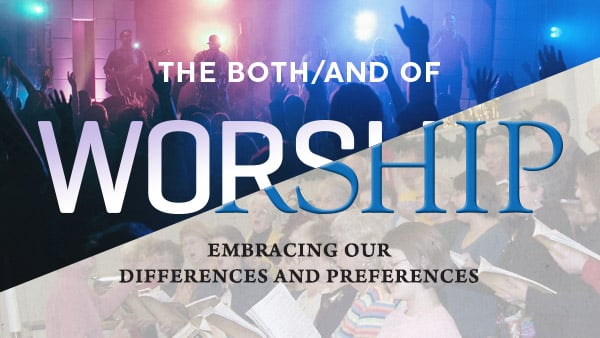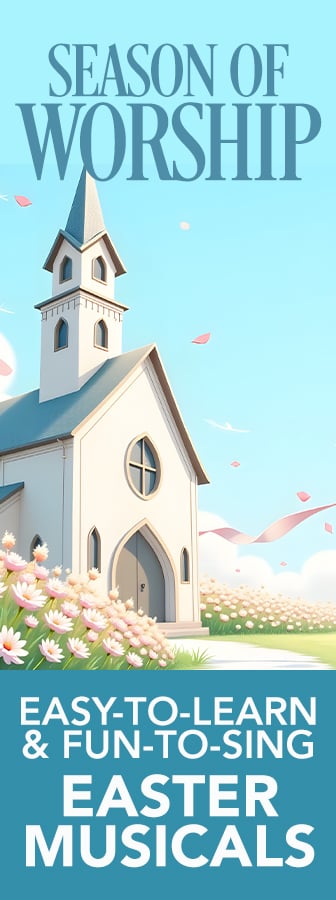
As you might imagine, I read a lot of articles about worship. If you’re reading this, I imagine that you do, too.
From those I’ll call the “modernists,” I’m reading a lot about a fresh move of the Spirit creating a certain musical seamlessness and atmospheric ambiance in the sanctuary. Worshipers are immersed in waves of voices, instruments, lights and sound sweeping over them. Lyrics are minimal. Melodies are simple. Harmonies are optional.
Some modernists toll the death-knell of robed choirs, pre-arranged vocal parts, and traditional orchestration. Oddly enough, though many of their “new” and most popular worship songs borrow heavily from both traditional hymns and revival-type lyrics, hardcore modernists rarely use songs that are more than a few years old.
From those I’ll call the “traditionalists,” I’m reading a lot about the imminent collapse of the contemporary praise and worship movement, the lack of musical professionalism, and the absence of lyrical integrity.
Ardent traditionalists complain that the performance orientation of modern worship leaders and the volume level of the music are creating a whole generation of non-singing congregants. They are critical of songs written by hipsters and prefer the classics arranged by eminent composers whose works have passed the test of time. They opine that today’s worship music is banal and profane--written by unenlightened, lazy, pseudo-musicians.
I’m not making this up. Both sides are saying stuff like this...and worse.
And that’s the problem: we’ve taken sides against one another instead of asking, “How can we support and encourage others in their authentic worship of our holy, merciful God?”
These kinds of “worship wars” are definitely “First World” problems.
The vast majority of believers on our planet do not have these kinds of debates. They lift their voices in their own tongues accompanied by whatever instruments they have to sing songs with melodies that most of us could never follow composed by writers who will never be compensated by CCLI.
I understand why people like what they like: it’s because it speaks to them and they feel that it will speak to those around them as profoundly.
And yet... I’ve worshiped outside a mission school in Zimbabwe as children danced with abandon, singing in a language I’ll never understand. I’ve worshiped with the poor in the ghettos of Ecuador accompanied by a guitarist who only had 4 strings on his pitiful instrument. I’ve worshiped in open-air churches in Haiti and in the mountains of Bolivia with people who did not know where their next meal would come from.
I must confess that those people worshiped far more authentically that than I regularly do—in spite of all the resources, technology and training that I enjoy. Jesus says that his Father is seeking those who will worship him in Spirit and in Truth (John 4:23). Paul instructs us to sing heartfelt music and to encourage one another with psalms, hymns and songs of the Spirit (Eph. 5:19).
There you have it: true biblical worship is inspired and empowered by God’s Word and God’s Spirit.
It can be modern, atmospheric and nouveau; but it can also be traditional, liturgical and intellectually challenging. It can be simple and unison; but it can also be complex and polyphonic. It can be accompanied by a 4-stringed instrument or by a 40-piece orchestra. It can be whispered or shouted, knelt or danced, thousands of years old or spontaneously created. Sung by folks in robes, sandals or bare-footed.
I’m gradually learning that our God is the Lord of the “both/and.” Rather than our worship style being either this or that, perhaps it can be both this and that.
Our preferred stylistic distinctions are—shall we say—really only accidents of the time and place in which we find ourselves. If we were born and raised in some other time and place, it’s a safe bet our musical tastes would be dramatically different.
And its not that our differences aren’t important; rather, they simply pale in the light of the way our differences are celebrated and incorporated into the Body of Christ. (Gal. 3:26-29, Eph. 4:1-6)
So, whatever our stylistic preferences...
- Let’s not preach a gospel of worship uniformity. Rather, let’s embrace a spirit of unity that celebrates our unique worship flavors as they are offered in Spirit and in Truth. (1 Cor. 12:12-30)
- Let’s encourage one another's authentic songs, hymns and spiritual songs—in whatever musical context they are framed. (Eph. 5:19)
- When it comes to our musical differences, let’s move away from “us and them” and toward “Christ in us.” (Eph. 2:14-15)
- Let’s suspend criticism of each other’s talents and tastes. (Rom. 14:13-18)
- Let’s be willing to lay down our preferences and privilege in the service of others. Let our worship be more defined by our love for God and others than by our love of a specific style or liturgy. (1 Cor. 10:23-24)
There, I’ve probably offended almost everyone. If so, I apologize.
Rather, my heart is to help us see worship from God’s throne looking down, rather than simply looking up from our place on the platform. If we had the privilege of watching our Heavenly Father enjoy our worship, I believe we’d see his “both/and” heart for however his children worship him in Spirit and Truth.
In summary: more “both/and” and less “either/or.”
Amen.
--For more helpful articles about blended worship services and the issue of musical style, check out www.discoverworship.com and these articles:
- Arguing the Merits of a Blended Worship Service
- How Can We Add Musical Diversity to our Services?
- The Non-Issue of Style: It's Just Worth It
- Can Too Much New Get Old?
- Variety for Variety's Sake?
- 5 Compelling Reasons to Do More A Cappella Singing
- Worship on the Radio
- Expanding Our Worship Playlist
- The Age of the Top 25 CCLI Worship Songs
- The Both/And of Worship












